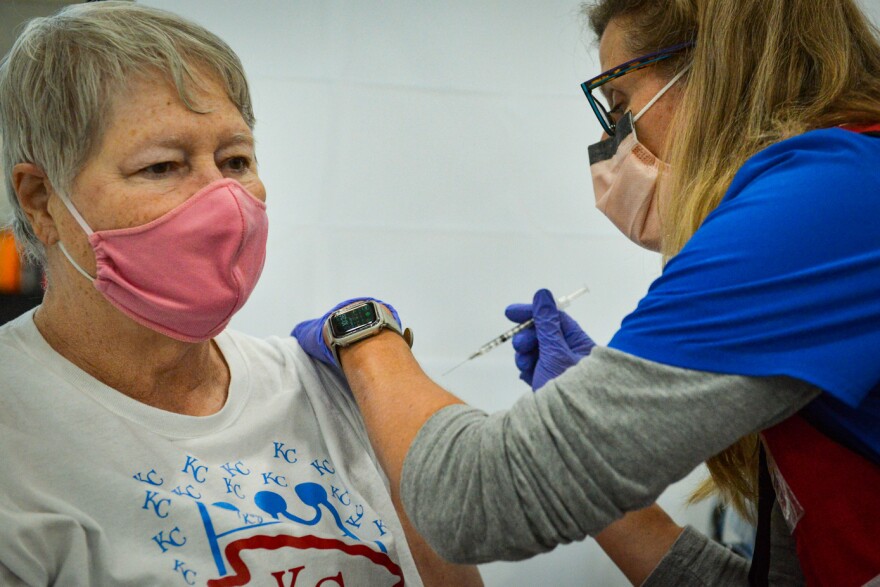Missouri Gov. Mike Parson signaled a new direction in the state's COVID-19 vaccination plan on Monday, unveiling a revised distribution strategy for the state.
The new plan will channel greater amounts of the vaccine into Missouri’s cities, which have lower vaccination rates than the state as a whole — a disparity that has led some to charge the state has mishandled the distribution process.
Missouri will schedule additional mass vaccination clinics in the Kansas City and St. Louis regions and dedicate 15% of its vaccine supply to addressing parts of the state deemed “vaccine deserts” owing to a lack of vaccination sites.
A news release from the governor’s office said that with the help of an additional 50,000 Johnson & Johnson vaccine doses the state is set to get this week, it would be able to increase the number of doses being distributed to urban areas.
Parson insisted that vaccines were being distributed fairly throughout Missouri.
“Individuals willing to do their homework will learn that each region, whether it be urban or rural, is receiving a percentage of our state’s total vaccine allocation that matches their region’s population size,” he said in the release.
Though the state’s plan calls for doses to be distributed according to population size, the state’s data show that the Kansas City region has received only 20% of the state's doses although it has 23% of its population.
While an average of 14.2% of Missouri residents had received at least one shot as of Monday, the rates throughout the Kansas City area remain lower. For example, 11% of Jackson County residents, 10.5% of Cass County residents, 12.5% of Clay County residents and 12% of Platte County residents have received shots.
Meanwhile, other counties that are part of so-called Region A have much higher rates. Saline County has a rate of 18.6%, Henry County 17.5% and Benton County 20.6%.
Though vaccines have been distributed through a number of channels, the strategy in Kansas City has largely relied on distribution through hospitals. More rural counties, meanwhile, have received vaccines mainly through mass vaccination events.
In recent weeks, as more residents became eligible for vaccinations, many who had expected to get shots were unable to find them locally. Instead they made road trips far from their homes to claim their doses in smaller communities, where the supplies have sometimes exceeded demand.
Nate Wheatley, a 36-year-old theater lighting designer from Independence, made a 180-mile round trip on Tuesday to Boonville – nearly halfway across the state – to get his first shot at a mass vaccination event at the Isle of Capri Casino. He'll have to return there in two weeks for his second shot.
He said frustration with the appointment process led him to make the trip rather than wait for a local appointment.
“If it means a longer trip to go get it, then I should probably just go get it when its available to me and not wait for something that’s convenient, because none of this really makes sense to me right now,” Wheatley said.
Wheatley said he was first offered a vaccination appointment a few weeks ago through the Missouri COVID-19 Vaccine Navigator in Clinton, Missouri, 90 minutes from his home. Thinking the drive was too far, he declined, expecting he would receive another appointment offer quickly.
When that didn’t happen, he grabbed the first available appointment he could on the state’s website, even though it required half a day of driving.
Many health care experts believe the lack of local access to shots has contributed to the low vaccination rates for non-white Missourians. While nearly 12% of white Missourians have received shots, just 4.5% of Black Missourians, 2.7% of Asian Missourians and 1.2% of American Indian/Alaska Native Missourians have received them.
The demographic data is muddled, however, due to the “multiracial” category, which is not clearly defined by the state but shows a vaccination rate of nearly 30%.
Many Kansas City metro residents contacted KCUR to say they traveled to appointments far from their homes, including some as far as the Iowa border. One said she scheduled an appointment in Unionville, a roundtrip of more than 300 miles.
Many eligible residents signed up on multiple city, county or state systems that they were eligible to use in hopes of nabbing an appointment.
Dr. Rex Archer, director of the Kansas City Health Department, said that he was aware of many people who had had to resort to such road trips, and he blamed the problem on inadequate early planning by the state.
“If a commitment had been made six or nine months ago that we’re going to need to do this mass vaccination, if the project had said let’s create a database system so that everybody could sign up and that we could match them with the closest place to get vaccinated, and it would be a one-stop-shop — that’s what should’ve happened,” Archer said.
In recent weeks, multiple mass vaccination events held in smaller communities in the state were given much more vaccines than they could use, according to social media and news reports.
Parson acknowledged those errors at a press conference on Thursday.
“We try our best to make sure those things are not happening,” he said.
Fresh opportunities to get vaccines are available this week in the Kansas City area, including a mass vaccination event being held at Cerner Corp.'s headquarters.
But until vaccine supplies increase significantly, many eligible people will need to wait or arrange for long road trips.
As Wheatley prepared for his 90-mile drive on Tuesday morning, he acknowledged feeling a tinge of discomfort thinking about all of the other people in Kansas City who didn’t have the same option he did.
“There’s a certain amount of guilt that I think comes along with it,” Wheatley said. “But if I make my world small and say ‘This is about my family and my house,’ then I can justify it to myself and move forward.”





